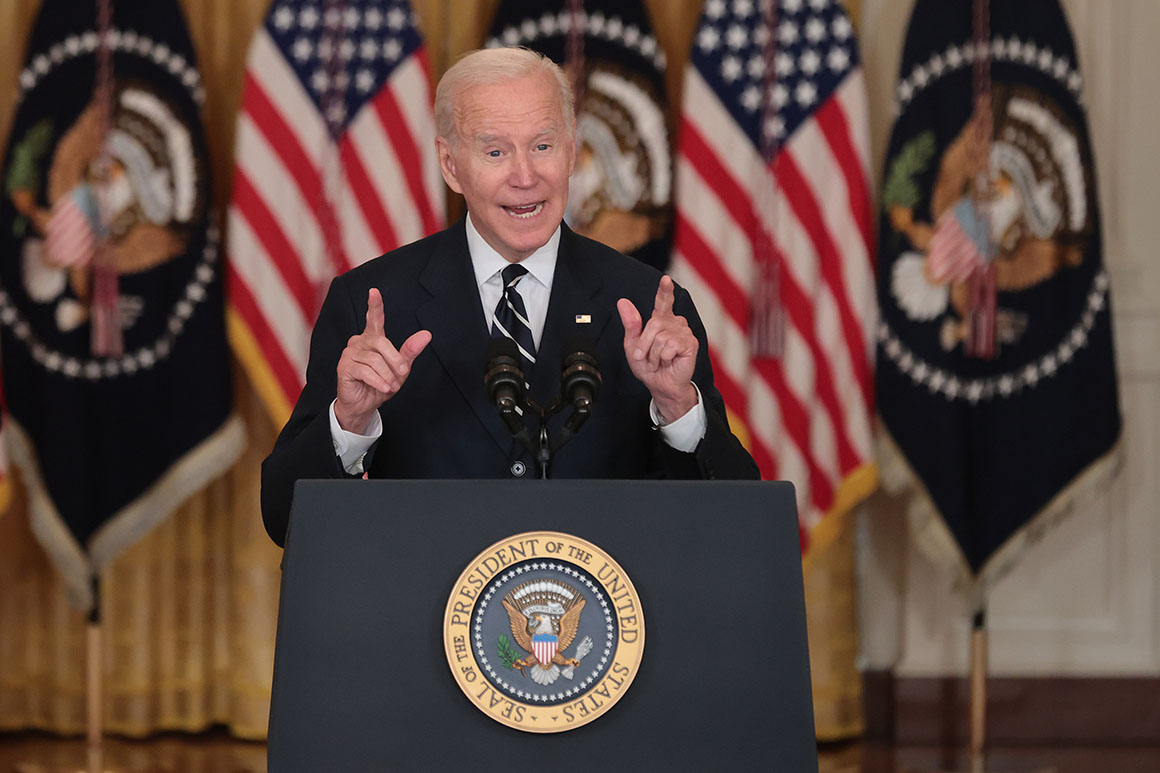
The U.S. economy is growing at its slowest pace since the recovery began. Faster inflation is likely to linger well into next year. Millions remain unemployed even as small businesses struggle to hire workers.
And Republicans are readying attacks on President Joe Biden over all of it.
GOP lawmakers and strategists are seizing on news Thursday that the economy expanded at an anemic pace in the third quarter to slam Biden and the Democrats, accusing them of bungling the recovery from the pandemic recession and then piling on trillions of dollars in spending programs.
Republicans plan to put economic issues front and center in the 2022 midterm campaigns by highlighting the soaring price of gasoline and some groceries and blaming Democrats for driving up inflation. It’s a double-barreled attack designed to zero in on the pain American consumers are feeling while ginning up opposition to legislation that Biden is hoping will become the linchpin of his economic agenda.
Voters are “sick and tired of paying higher prices for everything because of these big-government Democrats and their reckless spending,” said Rep. Tom Emmer (R-Minn.), who chairs the National Republican Congressional Committee. “We’re going to win back the majority on those kitchen-table economic issues that Democrats always fail to deliver on.”
Government data showed the U.S. economy grew at a weaker-than-expected 2 percent annual rate from July through September, the worst showing in a three-month period since the economic recovery began last year — and one that shows how much the surge in coronavirus cases due to the Delta variant and supply chain disruptions are dragging on growth.
That comes after the latest employment report earlier this month showed the economy added fewer than 200,000 jobs in September — far less than projected — while prices are continuing to rise at a rapid clip.
By next year, “the economy will reflect the problems that this country is having, and voters are going to act accordingly,” said Rep. Ken Calvert (R-Calif.), a deputy chair of the NRCC.
“If inflation is high, food prices are high, wages aren’t able to keep up with costs, the job market’s not coming back as quickly as we would like … it’s not going to be a difficult argument to make,” he said.
The Biden administration counters that inflation data must be looked at in the broader context of an economy that is recovering, with wages rising and Americans continuing to return to work. Top economic adviser Jared Bernstein told POLITICO this week that GDP numbers are backward looking, and he and many economists predict growth will jump back up through the fourth quarter this year.
A White House official defended job and economic growth on Thursday as "well above anything President Biden's predecessor ever imagined" and said the administration is concentrating on "making long term investments through legislation that Republicans oppose to prevent these sorts of problems in the future.”
Biden's $1.75 trillion Build Back Better package, officials say, will help create more jobs and bring more people back into the labor force. And more spending on infrastructure and social programs will not exacerbate inflation because it will be fully paid for and doled out over an extended time frame, according to economists.
But strategists and lawmakers say voters are likely to care little about details as long as the economic hurt remains obvious — not just higher prices, but more business closures as labor shortages persist, for example, and slower delivery times as supply chains remain clogged.
“The reality of the campaign situation is the Democrats are in charge and inflation is here,” said Curt Anderson, a Republican strategist. “That’s a really bad place for the Democrats to be.”
It's not just Republicans who are assigning responsibility to the administration for the rocky economic recovery, polls show. The percentage of Americans who have confidence in Biden’s ability to ensure a quick post-pandemic rebound dropped to 44 percent in October from 52 percent in January, an Axios/Ipsos poll this week found. All the losses were among Democrats and Independents.
The NRCC, in its own poll of suburban voters in battleground states this month, also found that 65 percent of those surveyed agreed with a statement that excessive government spending is hurting middle-class voters by sparking inflation. Less than one-third disagreed.
Republicans see that one path toward winning back a congressional majority in 2022 involves, among other things, holding and enlarging support among the working class, a group of historically Democratic voters, many of whom began to shift toward the GOP because of Donald Trump. Biden’s sweeping social spending plan is aimed in part at shoring up support among those voters by lifting them up through capping child care costs, for example, and reducing health care premiums.
But Republicans are warning that plan could backfire if the additional spending required to fund those programs allows inflation to spiral out of control — or if it’s merely perceived that way.
“You may have a situation where this bill will do more damage than good — significantly more damage than good,” Calvert said.
Democrats, however, say passing the plan in some form is the best path forward for the party and for the country, arguing that the investments it makes will accelerate the recovery while helping Americans over the long term. And they downplay the concern over individual data points, such as the sluggish third-quarter GDP growth, by emphasizing that the path back from the pandemic-induced recession was never going to be a straight line.
“Democrats in Congress are in it for the long haul,” Rep. Don Beyer (D-Va.), who chairs the Joint Economic Committee, said Thursday.
----------------------------------------
By: Megan Cassella
Title: Trouble ahead for Dems: A barrage of attacks over the economy
Sourced From: www.politico.com/news/2021/10/29/trouble-dems-economy-517513
Published Date: Fri, 29 Oct 2021 03:30:52 EST






